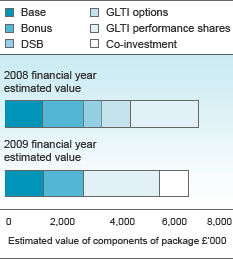Review of the executive directors’ remuneration
The Remuneration Committee commissioned a full review of the reward arrangements for the Vodafone executive directors in the 2008 financial year.
The remuneration policy was last amended in 2002.
Remuneration policy
Vodafone wishes to provide a level of remuneration which attracts, retains and motivates executive directors of the highest calibre. To maximise the effectiveness of the remuneration policy, careful consideration will be given to aligning the remuneration package with shareholder interests and with best practice.
The aim is to target an appropriate level of remuneration for managing the business in line with the strategy. There will be the opportunity for executive directors to achieve significant upside for truly exceptional performance.
In setting total remuneration, the Remuneration Committee will consider a relevant group of comparators. Comparators will be selected on the basis of the role being considered. Typically, no more than three reference points will be used. These will be as follows: top European companies, top UK companies and, particularly for scarce skills, the relevant market in question.
These comparators reflect the fact that currently the majority of the business is in Europe, the Company’s primary listing is in the UK and that the Remuneration Committee is aware that in some markets, the competition is tough for the very best talent.
A high proportion of total remuneration will be awarded through short term and long term performance related remuneration. The Remuneration Committee believes that incorporating and setting appropriate performance measures and targets in the package is paramount – this will be reflected in an appropriate balance of operational and equity performance.
Finally, to fully embed the link to shareholder alignment, all executive directors are expected to meet and comply with the rigorous and stretching share ownership requirements set by the Remuneration Committee.
Changes to the package
The review of executive directors’ remuneration has had the following high level impact on the package for the 2009 financial year:
- no change to the base salary policy;
- no significant change to the annual bonus arrangement; and
- long term incentives will be awarded in the form of performance shares with an opportunity to co-invest. The Remuneration Committee does not foresee a requirement to award options or use the Deferred Share Bonus (“DSB”) in the immediate future. Vesting will be based on a performance matrix comprised of operational and equity performance.
These changes are summarised in the following table:
| Reward elements | 2007/08 measures | 2008/09 measures |
|---|---|---|
| Annual bonus | Business KPIs | Business KPIs |
| DSB | Free cash flow | Not applicable |
| Share options | EPS | Not applicable |
| Performance shares | Total shareholder return (“TSR”) | Free cash flow and TSR |
| Co-investment | Not applicable | Free cash flow and TSR |
Rationale for changes
The key purposes of making the changes are as follows:
Link to strategy
Focusing on driving the key measures of underlying business performance together with upside for strong market value performance.
Shareholder alignment
Increasing the co-investment opportunity and moving it from a two year deferral to a three year investment should increase the participants’ holdings in the Company.
Simplification
Moving to one long-term incentive vehicle (shares) simplifies the long-term arrangements.
Impact of changes on package

Comparison of estimated values for the Chief Executive in the 2008 financial year and the 2009 financial year
The estimated values are used to represent the level of different elements of the package. The analysis below assumes a one times salary co-investment, which is in line with the current opportunity under the DSB plan. The estimated value will be greater the more a participant co-invests (up to two times net salary).
Comparison of package structure for the Chief Executive in the 2008 financial year and the 2009 financial year
The Remuneration Committee continues to be comfortable with the structure of remuneration. Therefore, there is no significant change to:
- the split between fixed and variable pay; or
- the split between short term and long term pay (though note that all long term remuneration is now received over three years).
The actual percentages depend on the participant’s level of co-investment.
